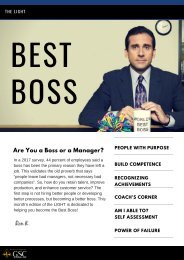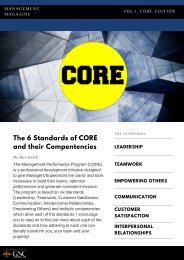CORE Jan 2019 (1)-compressed
Create successful ePaper yourself
Turn your PDF publications into a flip-book with our unique Google optimized e-Paper software.
T H E L I G H T<br />
F E B R U A R Y 2 0 1 9 : C O R E<br />
I N T H I S I S S U E :<br />
CUSTOMER<br />
SATISFACTION<br />
LEARNING YOUR<br />
EMPLOYEES<br />
TEAM UNITY<br />
COMMUNICATION<br />
INTERPERSONAL<br />
RELATIONSHIPS<br />
This month's magazine is all about your <strong>CORE</strong>. The Management<br />
Leadership Program (<strong>CORE</strong>) is designed to give Managers and Supervisors<br />
resources to build their teams, optimize performance, and generate consistency.<br />
This program is based on the following six standards: Leadership, Team Unity,<br />
Customer Satisfaction, Communication, Interpersonal Relationships, and<br />
Empowering Others. Once each competency is put into action, it will impact you,<br />
your team, and your property!
Customer Satisfaction<br />
No company has achieved success by treating their customers poorly. A challenge for many<br />
leaders is not making a distinction between internal and external customers. And, those who<br />
do often, have a different set of rules they apply to each group. Below is a list of<br />
5 Shared Expectations for both internal and external customers:<br />
Both the internal and external customers share these key expectations. Achieving exceptional customer<br />
service begins with being consistent in your treatment of internal and external customers. Customer<br />
Satisfaction won't become a reality if it is not a focus of your leadership. Below are 4 questions to ask<br />
yourself to ensure exceptional Customer Satisfaction is your focus:<br />
1. Am I exceeding the expectations of our residents in satisfying their community apartment needs?<br />
2. Am I sensitive, timely, patient and exhibit a professional attitude as I address the needs or<br />
concerns of our residents and prospects?<br />
3. Can I deliver my commitments and keep the resident or prospect informed by giving<br />
progress updates?<br />
4. Am I consistently looking for ways to enhance the business relationship with GSC customers?<br />
Anything less than putting the customer first will ultimately make GSC last.
Learning Your Employees<br />
Great managers know how to connect. They know how to aid in solving conflicts or<br />
disagreements with their team members. Below are 9 strategies to help connect with your team,<br />
resolve disagreements and learn from your employees:<br />
STRATEGIES TO CONNECT WITH OTHERS<br />
1. Take Time to find out what your team members<br />
need, value, and aspire to be. You should be<br />
engaging with team members on a consistent basis.<br />
2. Your Attitude Impacts The Atmosphere. With a<br />
positive demeanor, you'll be seen as more<br />
approachable and friendly.<br />
3. Be An Intentional Listener. Stop what you're<br />
doing and show that you value what is being said.<br />
4. Give Honest And Sincere Appreciation.<br />
Timely feedback and praise shows employees<br />
that they are valued. It also builds your business<br />
relationship.<br />
5. Monologues Vs. Dialogues. Have dialogues<br />
not monologues. Dialogues are considerate,<br />
authentic, secure and interested in meeting<br />
needs.<br />
WIN IN DISAGREEMENTS<br />
1. Try To Avoid Arguments By<br />
Understanding the other person's point of view<br />
and end the root of the disagreement. Is it worth<br />
damaging the relationship?<br />
2. Admit Faults Quickly. You should know by<br />
now when to apologize for mistakes.<br />
3. Give Credit, Not Everything Is About You.<br />
Great team members share in the<br />
victories. Eliminate selfishness. They are aware<br />
that it takes a collaborative effort.<br />
4. Don’t Criticize, Condemn, or Complain! In<br />
moments of disagreement, refrain from negative<br />
comments. Give yourself time to think and be<br />
selective with your words. People<br />
won't "unhear" your words, nor can you take back<br />
words that have been spoken.
Learning Your Employees<br />
An exercise to use at your next team meeting:<br />
Instructions: On a piece of paper, have your team list all coworkers and allow space for them to<br />
answer each statement/question listed below. Upon completion, review the answers and verify if<br />
they answered correctly. This exercise is intended to see how much they really know each other.<br />
The goal is to gain understanding as well as appreciation for one another.<br />
What's their favorite color? When's this person's birthday? What show or book do they enjoy?<br />
What's their music preference? Name something they like. Name something they dislike.<br />
Does this person own a dog? How long have they worked for GSC? What's their spouse's name?<br />
4 Areas That Hinder The Team From Winning:<br />
Personality Styles<br />
Credibility<br />
Emotions<br />
Lack Of Communication And Clarity
To win and<br />
influence people,<br />
one must show<br />
compassion,<br />
empathy, and<br />
have the needs of<br />
others above<br />
their own.<br />
Patrick Barwise<br />
(Author)
Team Unity<br />
Team Unity is the process of people joining together in effort, skill and desire to reach their goal. All<br />
teams go through challenges. It’s how we respond, cooperate, and collaborate with one another<br />
during those difficult times that distinguishes a good team from a bad one. Below are 5 principles<br />
all good teams share:<br />
1. They trust one another; honesty<br />
must be present.<br />
2. They engage in professional<br />
and respectful dialogue around any<br />
conflict that may hinder the team's<br />
well-being.<br />
3. They commit to decisions and<br />
ask for feedback or suggestions<br />
among their peers.<br />
4. They hold one another accountable, rally around solving issues, and speak in terms of what is<br />
right versus what is wrong.<br />
5. They focus on the achievement as a collective result. (when one succeeds the team succeeds)<br />
"The long-term success of a team depends upon<br />
how it deals with failure."<br />
Every failure should be viewed as a growth opportunity and a way to prevent<br />
the failure from reoccurring. Below are some common causes of team failure:<br />
Unresolved Roles/Responsibilities: Teams are unclear, lack sense of<br />
accountability, and may not complete their task.<br />
Lack Of Trust: Do not trust each other or their team leader. They may undermine<br />
the team's efforts, withhold/doubt information, and prevent projects from moving<br />
forward.<br />
Lack Of Support: The team does not have the support from their manager and<br />
often cannot achieve their goals.<br />
Lack Of Communication: If the environment does not allow teams to openly<br />
share their ideas or thoughts, members won't be able to make informed<br />
decisions.<br />
Deadlock: Teams need to find common ground when they are split on an issue.<br />
Allow time to reach a compromise. Remember, winning is the ultimate goal.
Communication<br />
How we listen, what we say, and how we say<br />
it directly impacts a customer’s decision to buy or<br />
continue using our services. The same holds true<br />
for our internal customers. They receive or<br />
reject what you're selling (a.k.a. your vision) based<br />
on your communication. Your message to your<br />
customers and your team members should be<br />
clear, effective, and precise.<br />
Although verbal output can be turned off, nonverbal cannot. Even silence speaks. No matter how much you try,<br />
you can't avoid communication. In any event, words or silence all have a message value. They influence others<br />
and you cannot not respond to these communications. Below are 8 nonverbal communications:<br />
1. Facial Expression<br />
2. Gestures<br />
3. Tone, Mood, and Pitch<br />
4. Body Language and Posture<br />
5. Proximity<br />
6. Eye Gaze<br />
7. Touch<br />
8. Appearance (Color, Clothing, Hair, etc.)<br />
Be timely with effective feedback (positive or constructive). Provide the information as close to the event as<br />
possible. Check to make sure the individual understood what you said by asking questions and observing<br />
changes in their behavior. A common mistake is for you to feel that your words are the focus in the<br />
conversation. Equally as important, is the way you project your tone, proximity, and body language.<br />
Interpersonal Relationships<br />
"You have to get people to be as results-driven and passionate as you are, only then will you be ten times<br />
more successful" (Fitzgerald). Your primary goal as a leader is to ignite your employees' passion for their<br />
work, and to mobilize them to meet challenges. Challenge your employees to grow by implementing the<br />
following interpersonal relationships strategies:<br />
MINDFULNESS<br />
True leaders seek to live in full consciousness of themselves and others. When you<br />
are mindful, it helps you make the right choices about how and/or when to respond<br />
to people and situations.<br />
HOPE<br />
Develop a vision for your team and articulate it to them. Once you set achievable<br />
goals, you must believe that you can obtain them and celebrate small successes.<br />
COMPASSION<br />
Leaders are selfless and compassionate. Their heart is for their team to succeed<br />
and grow. When this happens, teams work harder, develop ownership and<br />
shows growth in character.
Coach's Corner<br />
If your actions inspire others<br />
To DREAM more,<br />
To LEARN more,<br />
To DO more,<br />
And BECOME more,<br />
YOU ARE A LEADER.<br />
-John Quincy Adams<br />
Reading available through<br />
Further<br />
GSC Training Department!<br />
the<br />
Our book of the month is Resonant Leadership. In this book, Richard Boyatzis and<br />
Annie McKee go into detail about transforming your emotions and the emotions of<br />
others, which will in turn drive success. You can learn how to ignite passion into<br />
your team's work as well as improve your own performance. Request your copy of<br />
the book by emailing dmeeler@gscapts.com to get yours today.
Follow us for more training tools.<br />
The GSC Training Department Page<br />
gsctrainingdept<br />
If you have a request you'd like to<br />
see featured, please reach<br />
out to dmeeler@gscapts.com












